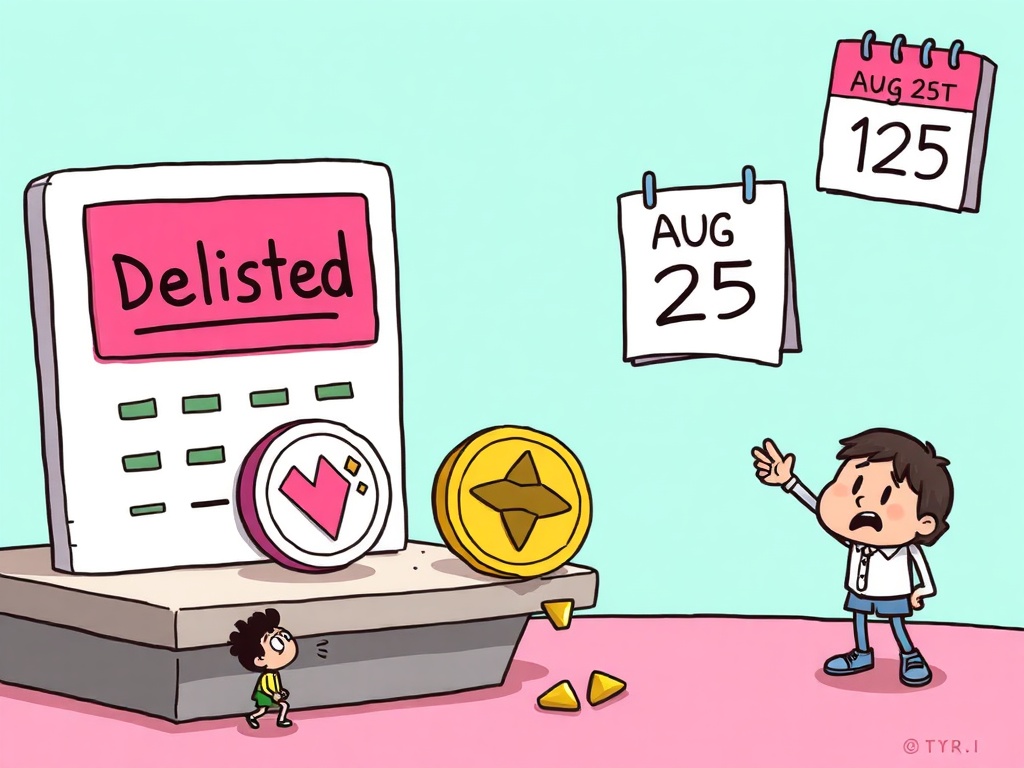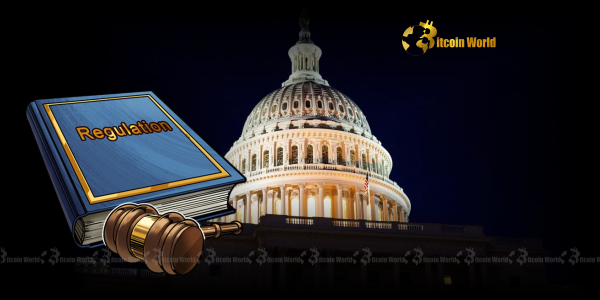BitcoinWorld

Bithumb Delisting: Urgent Alert for WOM and KWENTA Holders
The cryptocurrency world is constantly buzzing with activity, from groundbreaking innovations to market shifts that can impact investors significantly. One such development that demands immediate attention for many crypto enthusiasts and investors is the recent announcement from South Korea’s major crypto exchange, Bithumb. If you hold Wom Protocol (WOM) or Kwenta (KWENTA), an urgent Bithumb delisting is on the horizon, requiring swift action.
Understanding the Urgent Bithumb Delisting of WOM and KWENTA
Bithumb, a prominent player in the South Korean digital asset market, recently made a crucial announcement on its official website. The exchange confirmed that it will cease support for Wom Protocol (WOM) and Kwenta (KWENTA) tokens. This significant Bithumb delisting is scheduled to take place at 06:00 UTC on August 25. For holders of these specific assets, this news is not just a market update; it’s a critical deadline that necessitates immediate attention and action to prevent potential loss of funds.
Delisting from a major exchange like Bithumb can have several ramifications for the affected tokens, primarily concerning their liquidity and accessibility. Investors who currently hold WOM or KWENTA on the Bithumb platform must understand the implications and the limited timeframe available to them.
Why Do Crypto Exchanges Implement Delisting Actions?
The decision to delist a cryptocurrency is never taken lightly by exchanges. It often stems from a combination of factors aimed at maintaining a healthy, compliant, and secure trading environment for their users. While Bithumb’s specific reasons for the WOM and KWENTA delisting weren’t detailed, common rationales behind such actions include:
- Low Trading Volume and Liquidity: Projects with consistently low trading activity can become a burden, making it difficult for users to buy or sell.
- Regulatory Compliance Concerns: Tokens falling out of compliance with new regulations or deemed securities may face delisting.
- Project Inactivity or Lack of Development: Stagnant projects or those failing to meet roadmap milestones can be delisted to protect users.
- Security Vulnerabilities: Any discovered vulnerabilities in a token’s smart contract that could put user funds at risk.
- Failure to Meet Listing Criteria: Ongoing requirements like regular reporting or technological updates.
Understanding these general reasons helps contextualize the current Bithumb delisting and highlights the dynamic nature of the crypto market.
What Does This Bithumb Delisting Mean for WOM and KWENTA Holders?
For individuals holding Wom Protocol (WOM) and Kwenta (KWENTA) on Bithumb, the impending delisting means that after August 25, 06:00 UTC, they will no longer be able to trade, deposit, or potentially withdraw these tokens directly from the Bithumb platform. This has several direct implications:
- Loss of Trading Access: Inability to buy or sell WOM and KWENTA on Bithumb, reducing liquidity.
- Potential Price Volatility: Delisting announcements often trigger selling pressure, leading to sharp price declines.
- Need for Timely Withdrawal/Transfer: Users must move their tokens off Bithumb before the deadline to avoid inaccessibility.
- Search for Alternative Platforms: Holders will need to identify other exchanges or decentralized platforms where WOM and KWENTA are still traded.
The urgency of the Bithumb delisting cannot be overstated. Procrastination could lead to significant inconvenience or even financial loss.
Urgent Actions to Take Before the Bithumb Delisting Deadline
If you are impacted by the Bithumb delisting of WOM and KWENTA, immediate action is required. Here’s a step-by-step guide on what you should do:
- Verify Your Holdings: Log into your Bithumb account and confirm the exact amount of WOM and KWENTA you hold.
- Understand the Deadline: Reconfirm the delisting time: August 25, 06:00 UTC. Mark this date prominently.
- Choose Your Strategy:
- Sell Your Tokens: If you wish to exit, sell your WOM and KWENTA on Bithumb before the deadline. Convert them to a stablecoin or fiat.
- Withdraw to a Personal Wallet: If holding long-term, withdraw to a secure personal wallet (e.g., MetaMask, Ledger). Ensure correct network and address.
- Transfer to Another Exchange: Research other reputable exchanges listing WOM and KWENTA. Create an account and transfer your tokens there, double-checking addresses.
- Execute Transactions Well in Advance: Do not wait until the last minute. Initiate transactions several days before August 25 to avoid system issues.
- Confirm Transactions: Always verify successful processing and arrival of funds at their destination.
Taking these proactive steps will help you navigate the Bithumb delisting smoothly and protect your digital assets.
Navigating the Post-Delisting Landscape: What Happens Next for WOM and KWENTA?
Once the Bithumb delisting takes effect, the immediate accessibility of WOM and KWENTA will be significantly reduced for Bithumb users. However, the tokens themselves do not cease to exist. Their future viability will depend on:
- Other Exchange Listings: Presence on other reputable exchanges is crucial for continued liquidity.
- Project Development: The Wom Protocol and Kwenta teams’ continued development and efforts to secure new listings.
- Community Support: A strong and active community can help sustain the ecosystem.
While a Bithumb delisting is a setback, it doesn’t necessarily mean the end for a project. It signals a period of uncertainty and often, increased volatility. Diligence and research become even more paramount.
The Broader Implications of Crypto Delistings for the Market
The Bithumb delisting of WOM and KWENTA is a stark reminder of the inherent risks and dynamic nature of the cryptocurrency market. Such events highlight several broader implications:
- Due Diligence is Key: Investors are reminded of the importance of thorough research (DYOR) into any crypto project.
- Diversification: Spreading holdings across different assets and platforms mitigates risks from adverse events like delistings.
- Regulatory Scrutiny: Delistings often reflect increasing regulatory pressure on crypto exchanges.
- Market Maturity: Exchanges are becoming more selective, prioritizing quality and compliance.
These delistings, while disruptive, contribute to the overall maturation and cleansing of the crypto ecosystem, pushing for higher standards.
The Bithumb delisting of Wom Protocol (WOM) and Kwenta (KWENTA) on August 25, 06:00 UTC, serves as a critical warning for affected holders. This event underscores the volatile yet evolving landscape of digital assets, emphasizing the necessity of proactive management of one’s crypto portfolio. Whether you choose to sell, withdraw, or transfer, acting swiftly and decisively before the deadline is paramount to safeguard your investments. Stay informed, remain vigilant, and always prioritize the security of your digital assets in this ever-changing market.
Frequently Asked Questions (FAQs) About Bithumb Delisting
Q1: What exactly does it mean for a cryptocurrency to be “delisted” by Bithumb?
A1: When Bithumb delists a cryptocurrency, it means the exchange will no longer support trading, deposits, or often withdrawals of that specific token (WOM and KWENTA in this case) after the specified date, effectively removing it from their platform.
Q2: Why did Bithumb decide to delist WOM and KWENTA?
A2: While Bithumb’s official announcement did not provide specific reasons for the WOM and KWENTA delisting, common factors for such decisions include low trading volume, regulatory compliance issues, project inactivity, or failure to meet the exchange’s ongoing listing criteria.
Q3: What actions should I take before the August 25 Bithumb delisting deadline?
A3: If you hold WOM or KWENTA on Bithumb, you should either sell your tokens on the exchange, withdraw them to a personal cryptocurrency wallet, or transfer them to another exchange that still supports these assets. Do this well before the August 25, 06:00 UTC deadline.
Q4: Will WOM and KWENTA cease to exist after the Bithumb delisting?
A4: No, the tokens themselves will not cease to exist. A delisting only means they are no longer supported on Bithumb. They may still be traded on other exchanges or decentralized platforms, and their respective projects (Wom Protocol and Kwenta) may continue development.
If you found this article helpful in understanding the implications of the Bithumb delisting and how to protect your assets, please consider sharing it with your network! Spreading awareness helps the crypto community stay informed and secure. Share on Twitter, Facebook, LinkedIn, or your preferred platform!
To learn more about the latest crypto market trends, explore our article on key developments shaping digital assets price action.
This post Bithumb Delisting: Urgent Alert for WOM and KWENTA Holders first appeared on BitcoinWorld and is written by Editorial Team





